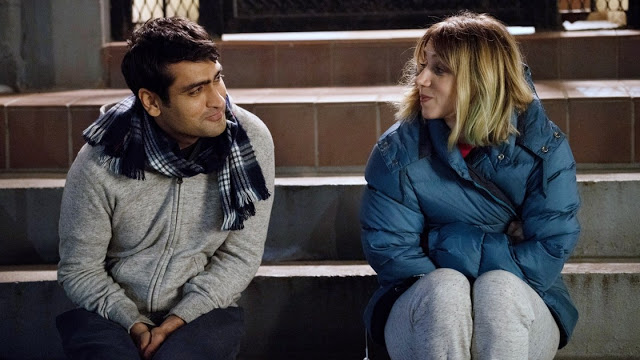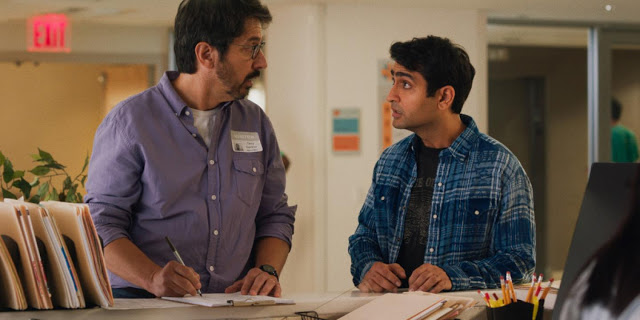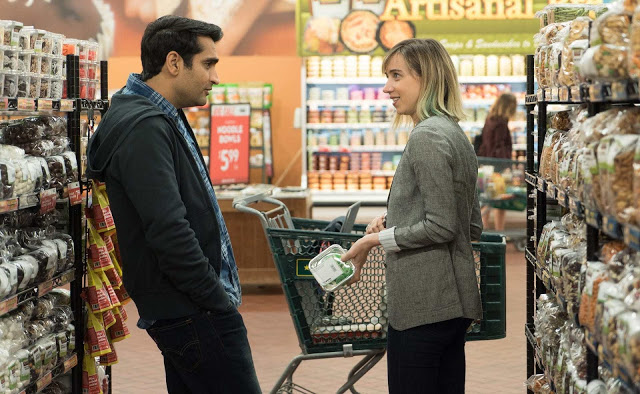“There’s not just going to be a magic spark,” a mother tells her son early in The Big Sick. “You have to work at it.” Honestly, has this woman never seen a romantic comedy? One of our most durable and pleasurable genres, it is undergirded by the notion that cinematic serendipity—the meet cute, the screwball misunderstanding, the shop around the corner—is very real, and could happen to you. Well, what better way to illustrate this than by telling a true story? The script for The Big Sick, Michael Showalter’s sweet and sensitive new movie, was written by real-life couple Kumail Nanjiani and Emily V. Gordon, and it chronicles their first date, ensuing courtship, and subsequent complications. Emily is portrayed by the terrifically talented and perennially underrated actress Zoe Kazan, but Nanjiani plays himself, lending further authenticity to a production already steeped in personal and locational detail.
Yet while the pieces are in place for The Big Sick to establish itself as a contemporary rom-com classic, it doesn’t quite do that—not because it’s a bad movie, but because it isn’t really a romantic comedy at all. Sure, there are plenty of laughs to be had, and for its first half-hour, the film executes the rom-com playbook with competence and conviction. As it progresses, however, The Big Sick becomes harder to pigeonhole. It operates, at varying times and often simultaneously, as a ruminative character study, as an exploration of the American immigrant family, and—most startlingly and most effectively—as a weepie.
But about that comedy. You might think, given that a number of professional funnypeople appear—in addition to Nanjiani, the cast includes stand-up comedians Bo Burnham, Aidy Bryant, and Kurt Braunohler—that The Big Sick is more comfortable with the “com” side of the rom-com equation. Yet the movie is only fitfully funny; it elicits its share of laughs but also induces quite a few winces. That may be the influence of Showalter, who’s best known for co-writing Wet Hot American Summer, a beloved cult property whose randomness and absurdity left this curmudgeonly critic stone-faced.
It is also a matter of structure and subject matter. The Big Sick is the latest in a recent spate of productions, on both big screen and small, that have functioned as a deconstruction of the comedy scene, scrutinizing stand-up and improv for their technique rather than simply basking in their results. (Examples: The Pete Holmes-led Crashing is making waves on HBO, the Jim Carrey-produced I’m Dying Up Here is floundering over there on Showtime, and Mike Birbiglia’s Don’t Think Twice earned polite applause in theaters last year.) This kind of behind-the-curtain approach offers verisimilitude, and The Big Sick effectively conveys the weird duality of comic culture, a communal world that’s nevertheless prone to dog-eat-dog competition, as long-suffering artists scratch and claw for their own big break. But it also means that much of the film’s humor is intentionally unfunny, as characters good-naturedly excoriate those around them for their lack of comedic chops. This can be amusing—when someone elaborates on a painfully bad quip about a giraffe, Kumail responds dryly, “I always like jokes that have to be explained to me”—but it often feels like a lazy substitute for writing actual jokes.
This is a flaw, but it’s an easily conquerable one, thanks to the movie’s winning emphasis on story and character. Produced by Judd Apatow, that manic entrepreneur with a mouth full of filth and a heart full of syrup, The Big Sick is less concerned with the laughs than the feels—it cares deeply for its principals, and it makes you do the same. It establishes its affectionate tone quickly: Kumail chastises Emily for shouting during one of his sets, she playfully pushes back, and before you know it, they’re making out on his air mattress as Night of the Living Dead blares from his television.
In its opening act, The Big Sick coasts on the charisma of its two leads, who exhibit a warm, relaxed chemistry. Because he’s playing himself, Nanjiani doesn’t have to stretch too far outside his range; he showcases an ability to emote late in the film, but for the most part, he imbues his aspiring comic with the same deadpan wit he brings to his superior engineer on Silicon Valley. Kazan, however, is simply radiant. With her pale-blue eyes and open face, the actress is prone to being cast as the Manic Pixie Dream Girl—an archetype she brilliantly subverted in Ruby Sparks—but here she is Kumail’s equal rather than his ideal. They make a splendid match.
Except that they also don’t, which is where The Big Sick starts getting interesting. Originally born in Pakistan, Kumail worries about upsetting his deeply religious parents, who insist that he honor their homeland’s traditions and choose a Muslim bride. This renders Emily persona non grata in the Nanjiani household, and the script examines Kumail and Emily’s resulting schism—she is understandably furious when she discovers that he’s been lying and that his family is unaware of her existence—with honesty and without judgment.
It is refreshing to watch an American film that tackles this peculiar facet of the immigrant experience—the collision of values old and new—with such forthright intelligence. (In this, it recalls the “Religion” episode of Aziz Ansari’s Master of None.) But The Big Sick has even more in store. As its title portends, illness falls upon the film like a reaper’s scythe, as Emily suffers an infection and suddenly falls into an unexplained coma. This begets the arrival of her parents, Beth (a wonderful Holly Hunter) and Terry (Ray Romano, underplaying beautifully), who politely inform Kumail that they appreciate his help but that they’ll take it from here. Of course, ridden with guilt and confusion himself, Kumail is not so easily ousted.
As invested as The Big Sick is in charting Kumail and Emily’s romance, it is equally committed to investigating the weird, mutable relationship that develops between Emily’s frantic parents and her similarly stricken not-quite-boyfriend. Together, the three gradually form a codependent triangle propped up by worry, anger, and tenderness. Spiky and severe, Beth is prone to lashing out, whereas Terry is more of a pacifier, trying both to soothe his wife’s anger and to acknowledge Kumail’s own stake in their daughter’s well-being. (The latter leads to the film’s best and bleakest joke, in which Terry resolves to “have a conservation” with Kumail about 9/11.) Over time, the trio develop a mutual respect that is cemented in the movie’s most surprisingly poignant scene: Forced to kill time, Beth and Terry attend one of Kumail’s sets, where Beth irately defends Kumail against a heckler who shouts, “Go back to ISIS!”
That moment is emblematic of The Big Sick: deeply conscious of its protagonist’s particular challenges, and also thoroughly committed to developing three-dimensional characters. It’s a movie that feels topical, less so for its primary plot (curiously, the film never comments on the issue of health insurance) than for its intersection of race, religion, and immigration. But it’s also a genuine crowd-pleaser, and despite some false notes—the timing of a late phone call feels contrived, and Showalter also delivers a nasty fake-out—it manages to lift your spirits without cheating. Any rom-com can make you laugh. This one makes you smile.
Jeremy Beck is the editor-in-chief of MovieManifesto. He watches more movies and television than he probably should.




